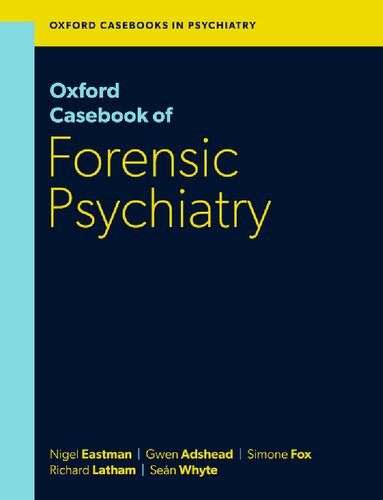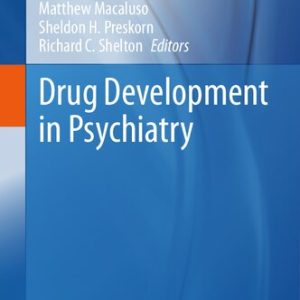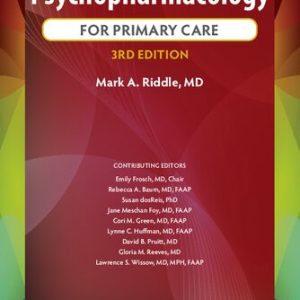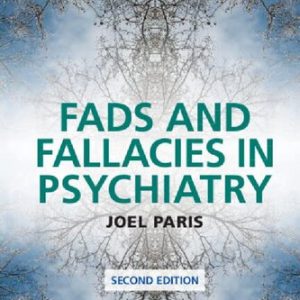| Designed as a companion to the Forensic Psychiatry (Oxford Specialist Handbook), Second Edition, this new casebook complements the domains of both theory and practice put forward in the handbook, but also works as a standalone volume for those who wishes to enhance their decision making in cases they may confront in their discipline.
Organised into three sections, the casebook allows the practitioner to think through not only the technical medical aspects of real-life clinical cases, but also the legal and ethical aspects. Part A provides an introduction to the theory and practice of decision-making; Part B presents cases across clinical, legal, and ethical domains; and Part C offers frameworks for critiquing decisions. This robustly discursive approach to a fact-based but also value-laden discipline enhances the opportunity to put knowledge into practice.
The Oxford Casebook of Forensic Psychiatry expresses the concept that ‘knowing is the only part of deciding’, offering an essential practitioner’s guide to decision making in clinical, forensic, and legal psychiatry. |
Table of contents :
Cover
Oxford Casebook of Forensic Psychiatry
Title page
Copyright
Dedication
Contents
Outline of the casebook
Part A: Decision-making
A.1 Decision-making theories
Rational decision-making
Nonrational decision-making
Dual processes: system 1 and system 2
Values at the heart of decision-making
Ease, bias, and heuristics
Values-based decision-making
A.2 Decision-making in practice
Clinical decision-making in both clinical and clinico-legal practice
Clinico-legal decision-making
Part B: Cases
B.1 Clinical cases
1 When is a case a ‘forensic’ case?
2 Use of behaviour without conviction within risk assessment
3 Risk assessment—clarifying the risks of harm to be assessed
4 Risk assessment—information needed and obtaining it
5 Hospital back to prison transfer—impact of values on decision-making
6 Forensic low secure versus general intensive psychiatric care (PICU)
7 A worked example of structured risk-assessment using HCR20v3
8 Secure hospital versus prison—psychosis, PD, and substance misuse
9 Risk assessment: founded on the PCL-R
10 Risk management—brain injury and prison offender programmes
11 Risk assessment in sexual offending
12 Transcultural assessment in sexual offending
13 Community risk-management—sex offences, psychosis, and drug misuse
14 Psychosis and PD—complex violence, step down in security
15 Patient threats against staff, request for transfer to higher security
16 Deciding on unescorted leave outside medium secure perimeter
17 Coercion in hospital and the community
18 Management of violent behaviour absent current mental illness
19 Management of self-harm and threats to others in borderline PD
20 Covert treatment of violence in psychosis, LD, and epilepsy
21 Life-sentence prisoner—remission from hospital back to prison
22 Use of social and occupational therapies in forensic psychiatry
23 Working with public protection arrangements
24 Relationship with justice ministry—partnership or productive tension?
25 Recall of a CTO patient
26 Supporting a court diversion scheme via consultation
27 Borderline PD and severe self-harm—prison or hospital?
B.2 Ethical cases
1 Right or duty to disclose defence report in criminal law context
2 Right or duty to breach confidence in civil law context
3 Duty to supervise a patient in the community
4 What information to share with patients
5 Treating psychiatrist as expert witness at criminal trial
6 Therapist as expert witness in civil litigation
7 Professional versus expert witness
8 Professional versus contractual duty
9 Medically relevant but legally inadmissible information
10 Role of personal values in expert decision-making
11 Uncertainty about your opinion and resisting legal pressure
12 Dispute within forensic mental health team and evidence to tribunal
13 Clash between clinician and organisational values
14 Role of personal values in risk-formulation
15 Continued detention after changed diagnosis and risk assessment
16 Monitoring as ‘treatment’ justifying continued legal restrictions
17 Assisting police and prosecution of a patient
18 Risk assessment informing sentencing after GBH conviction
19 Risk assessment for sentencing of patient currently in treatment
20 What is a ‘good-enough’ treatment outcome for patient progression?
21 Assisting the detection, prevention, or prosecution of serious crime
22 Professional boundary violations and workplace discrimination
23 Obesity—weighing treatment benefits against side-effects
24 When all options stink
B.3 Criminal law cases
1 Preparing an expert report on a vulnerable defendant
2 Assessment for suggestibility and compliance
3 Fitness to plead—intellectual disability plus psychosis
4 Fitness to plead—psychiatrists using psychological test results
5 Diminished responsibility—psychosis
6 Diminished responsibility—neurotic illness
7 Diminished responsibility—personality disorder
8 Diminished responsibility—recognised medical conditions
9 Diminished responsibility—substance dependence and intoxication
10 Loss of control or diminished responsibility?
11 Loss of control or diminished responsibility—‘slow burn’
12 Loss of control—woundability and malingering
13 Joint enterprise—encouraging or assisting
14 Capacity to form specific intent and intoxication
15 Capacity to form intent to kill—drugs and alcohol
16 Capacity for reform and sentence of death
17 Insanity—appeal against verdict and death sentence
18 Insanity or infanticide—by an adolescent
19 Duress—drug importation
20 Vulnerability short of duress—personality disorder
21 Self-defence in attempted murder
22 Automatism—intoxication
23 Automatism—brain injury
24 Automatism—dissociation
25 Ability to understand the police caution—dementia
26 Amnesia and brain injury—fitness for interview, interview reliability
27 Retracted confession—intellectual disability
28 Reliability of witness evidence—borderline personality disorder
29 Extradition and autism
30 Appeal against murder conviction—emerging psychotic depression
31 Request to alter court report for sentencing
B.4 Civil law cases
1 Clinical negligence—prison suicide
2 Right to disclose clinical information to third parties
3 Personal injury by ‘nervous shock’—PTSD
4 Battery and negligence—treatment in prison
5 Capacity to make a will—depressive illness
6 ‘Fitness to parent’ and risk of harm to a child
7 Rules of evidence in family proceedings—disputed and established facts
8 Evidence at the Medical Practitioners Tribunal Service
B.5 Mental capacity and mental health law cases
1 Mental capacity and mental health law—refusal of Caesarean section
2 ‘Appropriate treatment’ test—personality disorder
3 Choosing between mental health and capacity law—autism, mild LD
4 Assessment at the police station—psychosis and murder charge
5 Residual common law powers—delay in emergency situations
Part C: Critiquing decisions
C.1 The critique matrix
C.2 Legal critiquing in general
C.3 A case study of critiquing clinical decision-making within multiple paradigms
C.4 Other specific critique paradigms
C.5 Conclusion: self-critique as the gold standard
Postface
Index |



